

Home - Reflective writing - Skills Guide - LibGuides at University of Derby. - Reflection. Examples of Reflective Writing. Types of reflective writing assignments A journal requires you to write weekly entries throughout a semester.
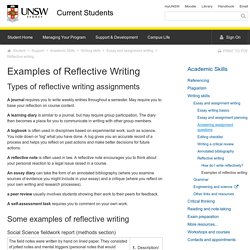
May require you to base your reflection on course content. A learning diary is similar to a journal, but may require group participation. The diary then becomes a place for you to communicate in writing with other group members. A logbook is often used in disciplines based on experimental work, such as science. A reflective note is often used in law. Reflective Writing Guidance notes for students. Reflective Blog Guidelines. Writing a reflective blog We will use a blog as a reflective journal of your journey through this class.
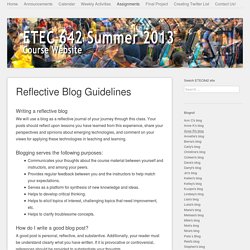
Your posts should reflect upon lessons you have learned from this experience, share your perspectives and opinions about emerging technologies, and comment on your views for applying these technologies in teaching and learning. Blogging serves the following purposes: Communicates your thoughts about the course material between yourself and instructors, and among your peers.Provides regular feedback between you and the instructors to help match your expectations.Serves as a platform for synthesis of new knowledge and ideas.Helps to develop critical thinking.Helps to elicit topics of interest, challenging topics that need improvement, etc.Helps to clarify troublesome concepts.
How do I write a good blog post? A good post is personal, reflective, and substantive. : how luxury brands from Bulgari to Burberry are responding to COVID-19 Collaborative Blogging as a Reflective Learning Tool. Blogging or web logging has long been used as a journaling method; the recording of one’s written thoughts and sharing it to the public space.
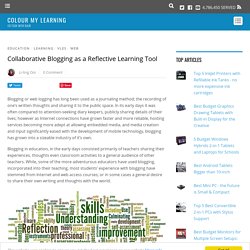
In its early days it was often compared to attention-seeking diary keepers, publicly sharing details of their lives; however as Internet connections have grown faster and more reliable, hosting services becoming more adept at allowing embedded media, and media creation and input significantly eased with the development of mobile technology, blogging has grown into a sizeable industry of it’s own. Blogging in education, in the early days consisted primarily of teachers sharing their experiences, thoughts even classroom activities to a general audience of other teachers. While, some of the more adventurous educators have used blogging, incorporated into their teaching, most students’ experience with blogging have stemmed from Internet and web access courses; or in some cases a general desire to share their own writing and thoughts with the world.
Reflective writing. Reflective writing is one of the most common methods used to assess work-based learning.
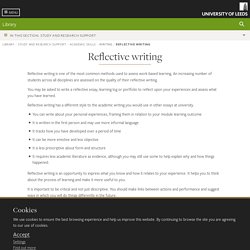
An increasing number of students across all disciplines are assessed on the quality of their reflective writing. You may be asked to write a reflective essay, learning log or portfolio to reflect upon your experiences and assess what you have learned. Reflective writing has a different style to the academic writing you would use in other essays at university. You can write about your personal experiences, framing them in relation to your module learning outcome It is written in the first person and may use more informal language It tracks how you have developed over a period of time It can be more emotive and less objective It is less prescriptive about form and structure It requires less academic literature as evidence, although you may still use some to help explain why and how things happened.
Reflections in the Age of Coronavirus (COVID-19) I hope you are fine.

Obviously, I write this blog at home, where I am with my family. We are all healthy, but we try to adapt to this situation, to stay isolated to protect ourselves and those around us. As if the Earth stopped spinning, everyone stopped doing everything and most of all, it is important to limit and stop the spread of the virus, to provide medical care for those in need and to research and test a vaccine. All other domains appear to be operating at minimal levels, with activity suspended or significantly reduced. Class hours in schools and universities and almost all professional meetings and events are either cancelled or postponed for an indefinite period. This post gives me the opportunity to share three reflections on this situation. Opportunities for self-reflection Are we ready for what will happen next?
Reflective writing : Skills Hub: University of Sussex. Reflective writing What is reflection?
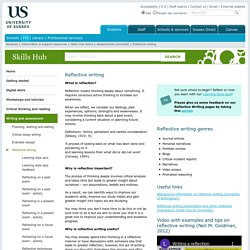
Reflection means thinking deeply about something. It requires conscious active thinking to increase our awareness. When we reflect, we consider our feelings, past experiences, opinions, strengths and weaknesses. It may involve thinking back about a past event, considering a current situation or planning future actions. Definitions: ‘Active, persistent and careful consideration' (Dewey, 1933: 9). ‘A process of looking back on what has been done and pondering on it and learning lessons from what did or did not work' (Conway, 1994). Why is reflection important? The process of thinking deeply involves critical analysis and takes time but leads to greater insight about ourselves – our assumptions, beliefs and motives.
As a result, we can identify ways to improve our academic skills, improve our study habits and gain greater insight into topics we are studying. Reflective Writing.